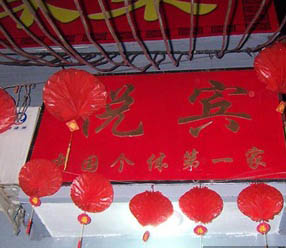Located barely 10 kilometers from each other, the two restaurants stand in a sharp contrast, in terms of appearance and ambience.
The single-storey Yuebin (Pleasing Guests) is hidden in a shabby hutong named Cuihua, while the imposing Qiaojiangnan (South Beauty) is embraced by the thriving Central Business District (CBD), steps away from Rem Koolhass's controversial Central China Television (CCTV) Tower.
|

|
|
Yuebin Restaurant
|
But Yuebin and Qiaojiangnan have one thing in common: both are pioneers of China's catering business -- one has been China's first private restaurant opened after China started the reform and opening up 30 years ago; the other the first Chinese restaurant to open branches in foreign lands and to make a brandname out of the Chinese foods everywhere in the world.
STARTING FROM SCRATCH
It never occurred to Guo Peiji that the opening of Yuebin would reverberate throughout China for many years to come, winning recognition in parallel with Xiaogang Village in south China's Anhui Province for the historic household land-contracting in 1978.
The reason is simple: Yuebin was the first private restaurant in China after the Cultural Revolution came to an end in 1976.
Guo, who had worked as a chef in state-owned hotels, enterprises and government organizations, decided to make a dramatic change of life in the autumn of 1980.
"My wife, Liu Guixian, and I were considering opening a restaurant of our own, as it was hard to maintain a living for a big family," recalls the 76-year-old Guo, sipping a cup of jasmine tea, and ensconced in an old-fashioned wooden armchair.
A father of five sons and one daughter, Guo found it difficult to find jobs for his two youngest sons after they graduated from senior high school. "I was neither manager nor official, securing no wealth or influence. By opening a restaurant, I guaranteed them a living, at least."
At that time, there were only a very limited number of cafeterias in Beijing, owned and operated by the state. The market supply was haphazard, and the main distribution channel of daily necessities and food was through coupons or stamps.
The outspoken Liu Guixian resigned from her 'iron-rice bowl' at a research institute affiliated to the State Administration of Environmental Protection and put her heart and soul in the brand-new business.
It worked out smoothly in the beginning. "To my surprise, my work unit, the Beijing Motor Factory, supported me by sending a truck loaded with tables and chairs," says Guo.
Even more exciting was that Cuihua hutong was packed with people on the opening day of his business. Guo recalls, "I had never seen such a large crowd, except in Dashilan (a well-known business district in old town of Beijing). I could hardly push my bicycle into the narrow lane."
The couple fixed reasonable prices. Customers paid less than one Chinese yuan for a fancy meal composed of a meat dish, a vegetable dish and a bowl of rice. "Yuebin quickly became a magnet in Beijing, attracting people from all walks of life."
The tiny restaurant signaled a significant social transformation and nascent personal wealth. When the Guos finished the first day of business, they were happy with their takings of 38 yuan RMB, equivalent to the monthly income of a senior worker at that time.
In a short time, Yuebin's name spread around the diplomatic missions in Beijing. One day, a US diplomat visited and requested a meal worth ten RMB, ten times more expensive than the standard order.
"We searched the whole market for duck and turtle, and we made it." Guo says.
Satisfied, the American drew dozens of table-sized maps showing Yuebin and distributed them in diplomatic circles.